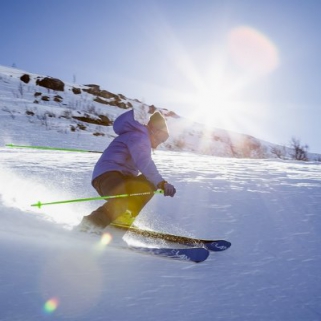Skiing Holidays Risk Sun Exposure
With half term just around the corner, the ski season is entering its busiest period.
Skiers look forward to spending time out of doors engaged in healthy pursuits, but although the temperatures may be below freezing, experts are warning that sun exposure is a big risk. Sun exposure is a major factor in melanoma (skin cancer), so it’s important to take your sunscreen as seriously as your helmet in terms of keeping safe on the slopes.
Why Skiers Are At Risk of Sun Exposure
The high altitude means that the sun is much stronger even on dull days, putting skiers at risk of sun damage. UV radiation exposure increases by around 4-5% with every 1,000 feet above sea level. This means that at an altitude of around 2,700-3,000m, UV radiation may be 35-45% more intense than at sea level.
Cloud is not a defence against the sun, as UV rays can penetrate. What’s more, clouds can clear and the weather can quickly change for the better. While the sun is a welcome surprise on a dull day, it’s best to make sure the skin is protected at all times.
Even with high SPF sunscreen, many skiers find that they have pink skin at the end of the day and although this could also relate to the chilly air, reddening skin is a known indication of excessive exposure to the sun’s harmful UV radiation.
One of the reasons for this is that apart from the altitude there is another factor which intensifies the sun’s rays. Snow reflects up to 80% of the UV light from the sun, thereby increasing the risks of sun damage. Another risk is that the sweat and snow can wear away sunscreen much faster than you’d think.
Many skiers will spend the whole day outside and if the weather allows, choose a sunny patio or a deckchair for lunch. This means that there’s no respite for skin that probably hasn’t seen much sun at all since late summer. Eating indoors could be a good idea to give the skin a rest over lunch.
Skiing Sun Protection Advice
Sun protection is really important when you’re skiing.
- Use sunscreen SPF 30 or more plus a lip balm designed for skiing with SPF included
- Apply 30 minutes before going out to ski, ensuring you get to all exposed skin including ears, eyes, neck
- Include the bits that are hidden by hats/goggles, as you’ll probably take those off at some point and would need sun protection
- Carry a mini sunscreen and lip balm to reapply every couple of hours
- Look for sunglasses or goggles with strong UV protection (99% or more). The skin around the eyes is sensitive and a common area for skin cancers
- Avoid skiing when the sun is at its peak and don’t sunbathe instead, seek indoor shade and shelter for a while
Suspicious Moles
If you spot any unusual moles or skin blemishes, do not hesitate to see a doctor to rule out skin cancer. Those that pursue an active outdoor lifestyle need to be especially alert. Remember the issues can arise years later, so be vigilant.
Cosmedics Skin Clinics’ team of mole removal doctors advocate regular self-checks to spot any suspicious blemishes as early as possible. Dr Ross Perry refers to it as the ‘ugly duckling’ syndrome – a skin lesion or blotch that looks odd or different from the others.
If in doubt, check it out.
Skin Surgery Laser Clinics
Cosmedics’ Skin Surgery Laser Clinic offer private mole removal at a selection of clinics based in London and Bristol. Moles are removed using the latest surgical techniques including laser mole removal; with trained doctors and surgeons.
Our team of qualified and experienced doctors and surgeons also treat other skin blemishes, including sebaceous cysts, skin tags, warts and lipoma using freezing, laser or surgical techniques.
For ultimate peace of mind, Cosmedics Skin Surgery Laser Clinic offer a thorough top to toe mole check carried out by their trained and experienced doctors.
Cosmedics Skin Clinics was founded in 2003 by Dr Ross Perry, a qualified and experienced London GP who has an excellent reputation in skin treatments and has removed thousands of lesions/blemishes in his career.
For more information or to book a consultation, please complete the form on this web page or call 020 7386 0464.



